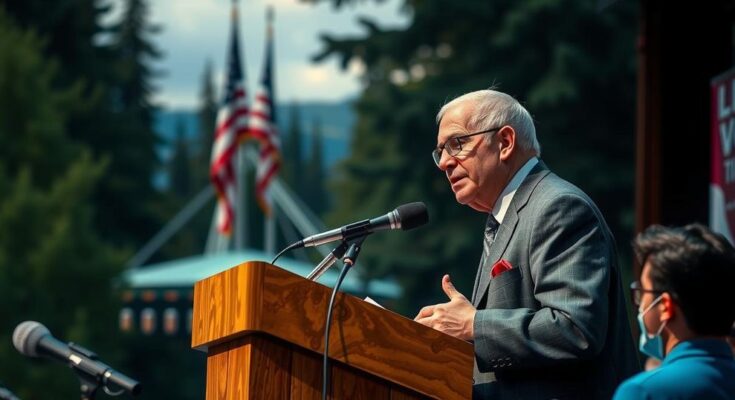The Human Rights Institute hosted Aaron Mair, a former president of the Sierra Club, for a lecture on the intersection of climate change and human rights. Mair emphasized the disproportionate impact of climate change on marginalized communities and advocated for equitable climate action. The event was organized by the institute’s co-directors, who highlighted the significance of environmental activism among youth. Mair stressed the importance of intersectionality and concluded by urging students to engage in community-based actions to foster change.
On Thursday, the Human Rights Institute welcomed Aaron Mair, a distinguished alumnus and former president of the Sierra Club, for a compelling discussion focused on the intersections of human rights and the climate crisis. Mair’s lecture took place in the Casadesus Recital Hall and emphasized the multifaceted nature of climate change, particularly its disproportionate impact on marginalized communities. In conjunction with the recent United Nations COP 28 summit, Mair advocated for an intersectional approach that addresses the needs and vulnerabilities of diverse populations affected by climate change. The event was organized by David Cingranelli, a professor of political science, and Alexandra Moore, an English professor, both serving as co-directors of the Human Rights Institute. Professor Cingranelli articulated the importance of engaging in environmental discourse, asserting, “Climate change is one of the most significant threats to human dignity. I expect that more and more people will come to realize the magnitude of the threat. As a result, I expect that there will be increasing activism, especially on college campuses, because young people have the most at stake.” Aaron Mair is recognized as a prominent environmental advocate with four decades of experience fighting for health, climate justice, and wilderness protection. His tenure as the first Black president of the Sierra Club and his chairmanship of the New York State Atlantic chapter underscore his dedication to environmental justice. During the lecture, Mair highlighted existing disparities exacerbated by climate change, stressing the urgent need for equitable solutions, particularly as both domestic and international communities face severe impacts from environmental degradation. Mair poignantly noted, “We’ve got hundreds of wilderness activists that have been killed, murdered, shot, not only in Africa, but also in Central America, Latin America, heavily massacred in Brazil,” emphasizing that these tragedies are not merely environmental concerns but issues closely linked to the survival of communities. He reflected on the aftermath of Hurricane Katrina, illustrating how the disaster uniquely affected Black, working-class residents due to systemic inequalities and discriminatory policies, stating, “natural disasters… led to wealth creation off of a crisis on the backs of communities of color.” Mair called upon students to actively engage within their communities to effect meaningful change, highlighting the pivotal role of young activists in tackling environmental and human rights challenges. He remarked on the significance of intersectionality as a framework, stating, “…that term, intersectionality… is an analytical lens… by which we can achieve great breakthroughs.” He reinforced the contention that understanding scientific principles alongside social justice issues is essential in the fight against climate change, emphasizing the historical leadership of communities of color in these movements. The Human Rights Institute supports educational initiatives aimed at further exploring these vital intersections, with plans for a new course on “Climate, Crime & Human Rights” in the forthcoming winter semester. Professor Moore articulated the institute’s commitment to addressing these intertwined issues, stating, “The Human Rights Institute helps to support the Food Justice Working Group… around environmental and food sustainability and food justice on our campus, in our community, and in New York state.”
The discussion around climate change and social justice has garnered increasing attention in academic and advocacy circles, particularly relating to the impact that environmental degradation has on marginalized communities. The intersectionality framework posits that various forms of discrimination and systemic inequality overlap, influencing how different groups experience climate-related challenges. Advancements in activism, particularly among younger generations, are crucial in addressing these pressing issues, as illustrated in the context of recent international efforts such as the United Nations COP 28. The work of leaders like Aaron Mair, who have dedicated their careers to environmental justice, further underscores the need for equitable interventions and inclusive approaches to tackle the climate crisis.
In conclusion, Aaron Mair’s lecture at the Human Rights Institute highlighted the critical intersection of climate change and social justice, particularly its detrimental effects on marginalized communities. The emphasis on intersectional approaches to climate action serves as a call to action for students and activists alike, encouraging collective efforts to enact meaningful changes within communities. The support from the Human Rights Institute in promoting relevant educational initiatives emphasizes the ongoing commitment to addressing these vital issues within academic discourse, ultimately fostering a more inclusive and equitable response to the climate crisis.
Original Source: www.bupipedream.com




